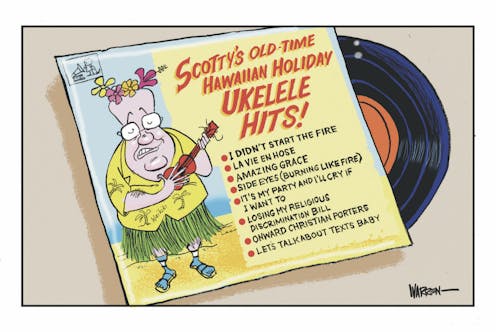
Although it isn’t mentioned anywhere on the cover of Russ Radcliffe’s latest offering, 2022 is the 20th anniversary of Best Australian Political Cartoons. That’s right – for anyone who has been collecting the books since they began in 2003, a whole shelf of plain blue, red, purple, green and gold spines now looks down from above, and a marvellous sight it is too.
Review: Best Australian Political Cartoons 2022 – Russ Radcliffe, ed., (Scribe)
As a chronicler of Australia’s recent political cartoon history, Radcliffe’s work is unmatched. Searching and witty, but straightforward introductions provide a retrospective of the year being chronicled. A suite of the best work by the best cartoonists – and not always the most prominent – then takes up the vast bulk of the page space.
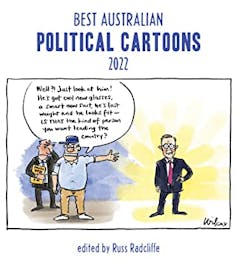
Cleverly chosen excerpts and quotations from key figures round out the 180-odd sustainably sourced pages. The lines are crisp and clear, despite some cartoons being digitally born, and less than the magic 300dpi (the minimum resolution needed for publishers to print images effectively without those horrible pixelisations you sometimes see).
Radcliffe’s annuals (supplemented by specials such as Man of Steel (2007), a retrospective on the Howard years, and My Brilliant Career (2016), chronicling the rise (but not yet fall) of Malcolm Turnbull) are only really approached by the sterling efforts of the National Museum, National Library, and Museum of Australian Democracy, who have published a smaller volume every year since 2002, called Behind the Lines.
This is an ideal companion volume to Radcliffe’s collection, in part because of its tone. Derived from Commonwealth government-funded institutions and exhibitions, there has been an increasing insistence from those holding the purse strings on “fairness”, and “impartiality” in this book when it comes to presenting the foibles and failings of both sides of politics.
Read more: From ScoMo to Albo: how a new cast of characters poses a challenge for cartoonists
Calling it as he sees it
As his 2022 offering indicates, this is not something Radcliffe has ever been comfortable with. He calls it as he sees it. Labor – “vapid and uninspiring”; Liberal moderates are “pusillanimous”; and the “usual suspects” on the conservative wings of the Coalition parties and elsewhere are exposed for their delight in “threatening to blow up yet another government” if they don’t get their way.
The same is true in international politics: Putin is “brutal yet incompetent”; the United States “a fickle and capricious ally”; and “getting the boys in the Anglosphere back together” over submarines or shared intelligence is shown up to be the kind of 1940s thinking it is.
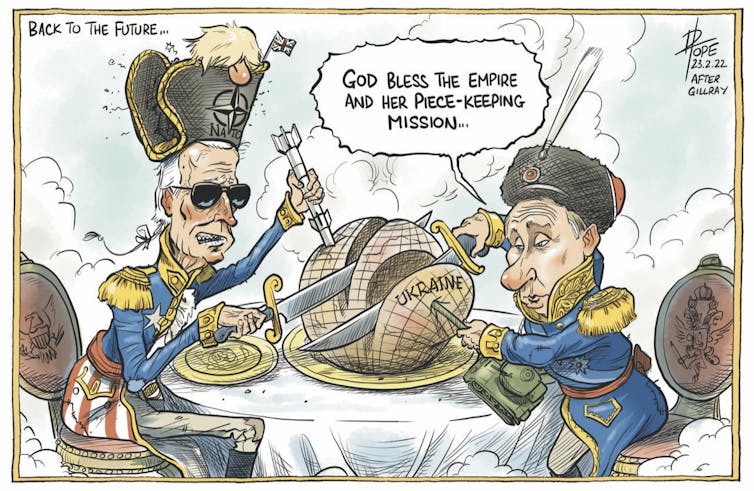
With Cathy Wilcox on the front, and Matt Golding on the back, the covers sandwich the Who’s Who of Australian cartooning. This was the year Michael Leunig gave up editorial page space in Melbourne’s The Age to new talent (not entirely willingly, it has to be said), and the immensely talented Fiona Katauskas finally landed a permanent staff job on The Echidna weekly newsletter.
It was also the year when David Pope never seemed to miss a target on his website or in the Canberra Times, and when even the right-leaning Mark Knight (Herald Sun), Warren Brown (Daily Telegraph), and Johannes Leak (The Australian) had a gutful of Scott Morrison’s government, and deployed their powerful pens accordingly.
For portraits of Morrison, it’s hard to go past Warren Brown’s rendering of “Scotty’s Old Time Hawaiian Holiday Ukulele Hits!” – a bootleg album including I Didn’t Start the Fire, La Vie en Hose, and Losing My Religious Discrimination Bill.
But Cathy Wilcox comes close, with another “greatest hits” collection (Novak Djokovic, Federal ICAC, the Biloela family, and more, appearing on Scott’s famous office “trophy cabinet” alongside “I Stopped These” boats/submarines).
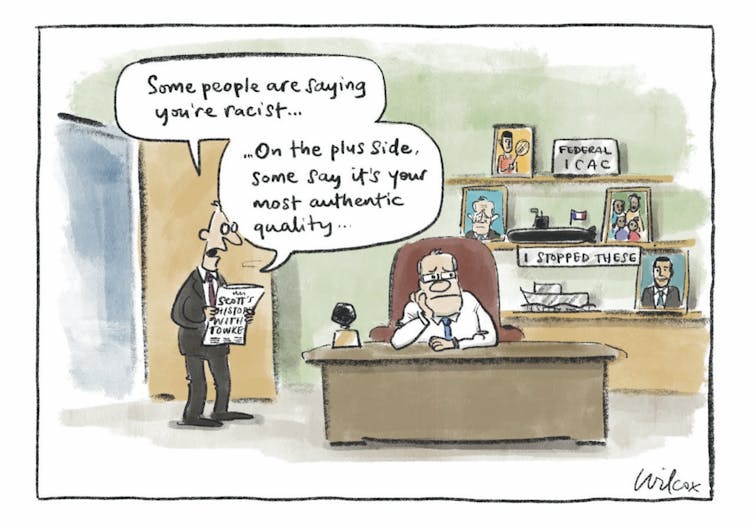
It always surprises me that Radcliffe has less to say about the immense talent in his pages than the characters they chronicle, but he is held in such high esteem among their number that the Australian Cartoonists Association gave him the 2013 Jim Russell Award for significant contribution to Australian cartooning. Perhaps, in part, it is because he allows them to speak for themselves.
They “speak” through Knight’s astonishing ability to caricature Sussan Ley, or Leak’s equally brilliant Lidia Thorpe. Ley’s manic grin as she tries to help Peter Dutton with his smile (alas, he keeps shattering the mirrors hung on the wall) is the living image of the Member for Farrer.
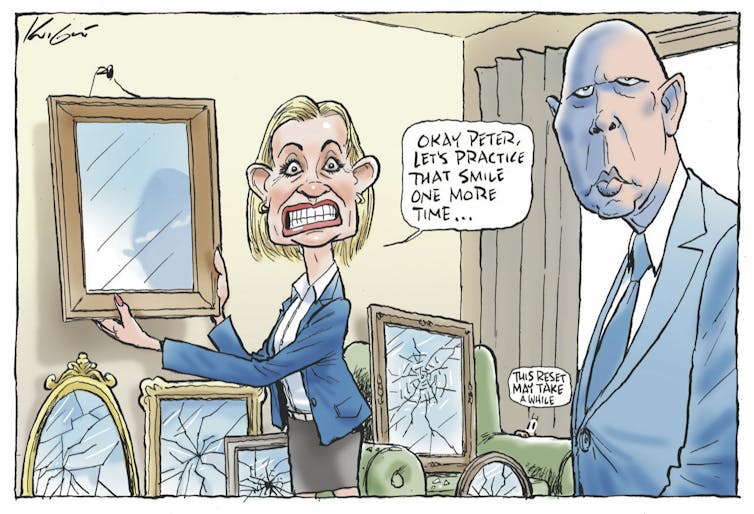
Thorpe’s revolutionary snarl, as she holds her Molotov cocktail and aerosol can (alongside Adam Bandt, flipping the bird to the viewer) is almost palpable.
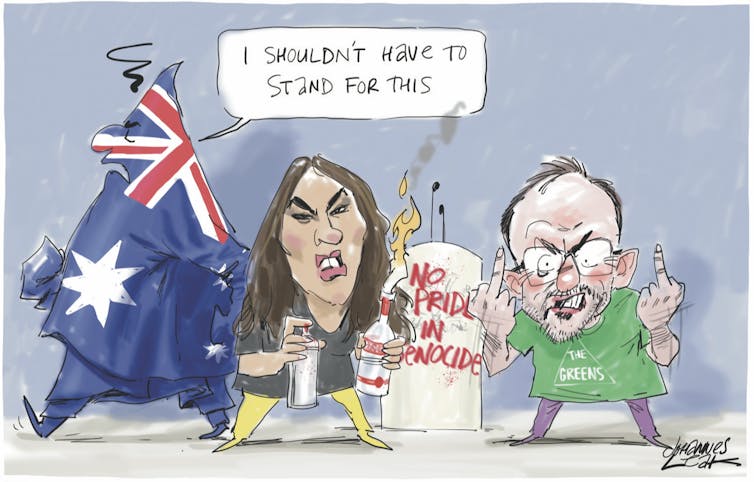
As is to be expected, the federal election is the absolute core of this volume. Readers will see how the same old Scott just could not hold a candle (or a hose) to the new, trim, terrific Albanese (and Radcliffe picked Wilcox’s take on that for his cover illustration). Unsurprisingly, Leak presents a less flattering portrait of the new PM but, it has to be said, the likeness is spot on.
New talent
The establishment – including the velvet sledgehammer of Wilcox (fully 21 cartoons); the grin-inducing grotesquery of David Rowe (22 cartoons); and Pope’s genius for the clear line (24 cartoons) – rubs shoulders with the emerging talent – Oslo Davis, Badiucao and Megan Herbert.
Herbert’s “coathanger” cartoon, lambasting both the lack of effective US gun laws and the neutering of Roe v Wade, is among the most startling, powerful cartoons to have appeared all year; possibly for years, if not decades.
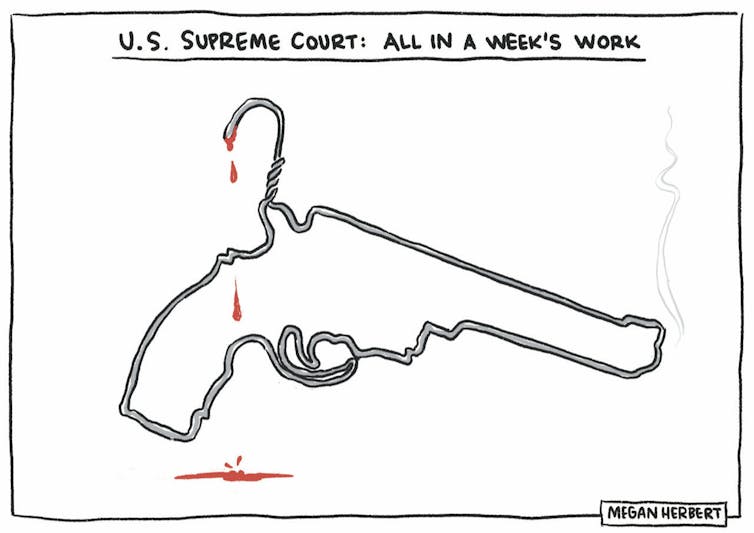
Badiucao’s depiction of Putin suckling at the teat of Xi Jinping would get him locked up (or worse) if he published in Moscow or Beijing. It’s worth remembering that Australians are actually allowed to do this sort of thing, and it arguably underpins our very democratic traditions.
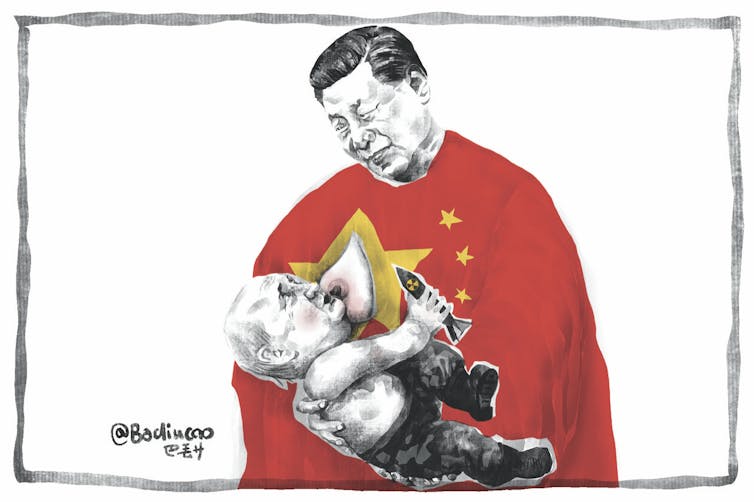
My favourite
The best cartoon of the collection?
As an historian, I’m partial to Pope’s reinterpretation of James Gillray’s famous 1805 depiction of William Pitt and Napoleon carving up the plum pudding of the world. As as Whovian, I love a good Dalek joke (thanks to Matt Bissett-Johnson,). As a former denizen of New England, I find Wilcox’s Barnaby Joyce a thing to behold.
But it has to be Pope, reimagining the invention of the outdoor dunny, with Pauline Hanson, Matt Canavan and Craig Kelly spouting all kinds of medieval conspiracy theories about why it won’t work and is a bad thing. Classic.
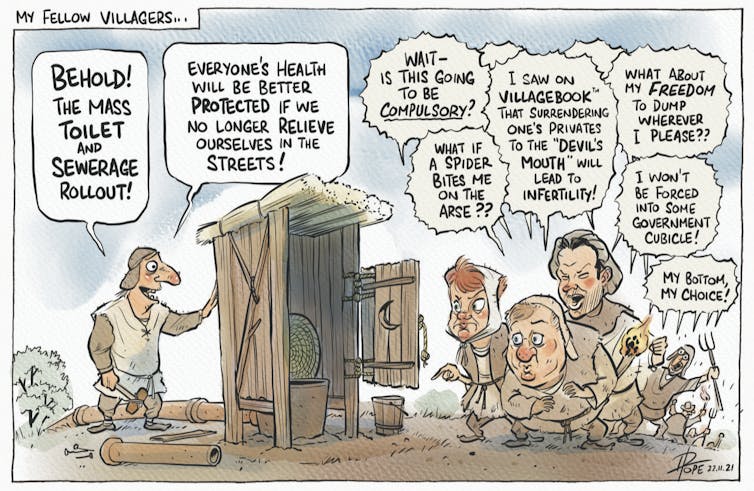
For historians, Radcliffe’s maddening refusal to provide the dates for the cartoons has prompted more than one tantrum, and trip to the relevant state or national library. Still, in a world of near-constant chaos, it’s nice to be able to rank Radcliffe’s volumes up there with death and taxes. We need a few certainties in life.
Richard Scully receives funding from the Australian Research Council. He is affiliated with the Australian Cartoonists' Association.
This article was originally published on The Conversation. Read the original article.







